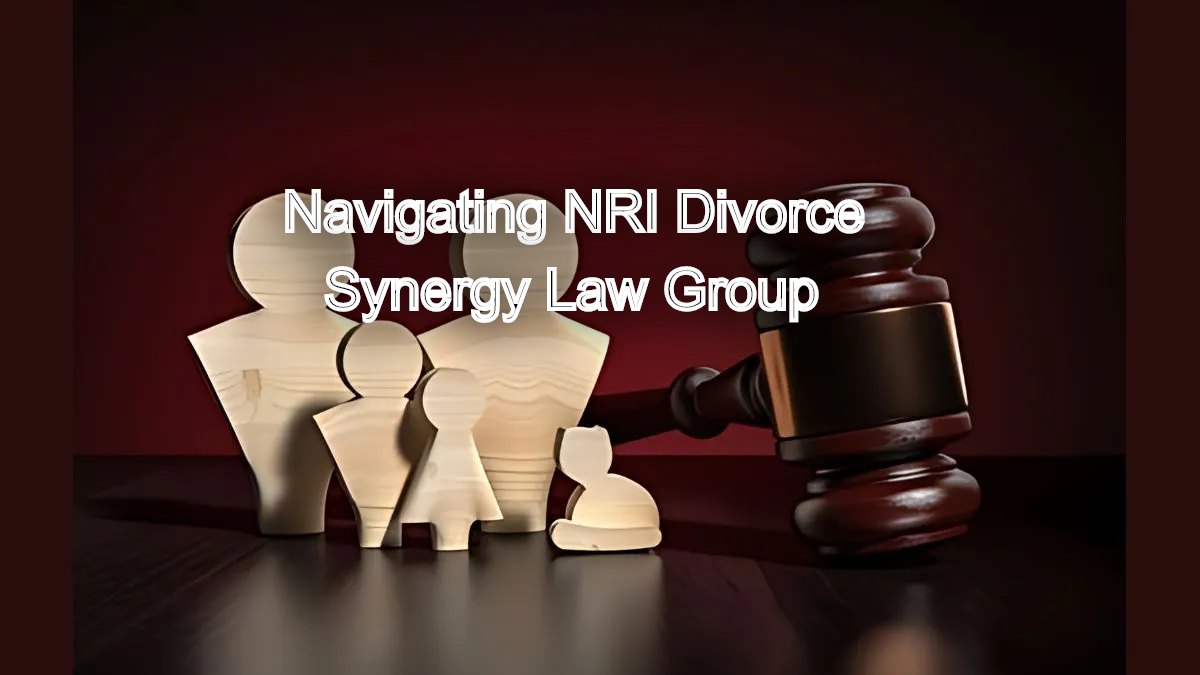NRI Divorce Matters: Navigating divorce proceedings when one or both parties are Non-Resident Indians (NRIs) presents unique challenges. At Synergy Law Group | Family Court Law Firm, we understand the complexities involved in NRI divorce matters. Indeed, these cases often involve cross-border legal issues, cultural sensitivities, and intricate financial considerations. Therefore, expert legal guidance is essential to ensure a fair and just resolution.
NRI Divorce Matters: Expert Family Court Advocate’s Expertise: Synergy Law Group
Understanding the Jurisdictional Complexities
First, jurisdictional issues play a significant role in NRI divorce cases. Specifically, determining which country’s laws apply and which court has jurisdiction can be complex. For example, if the marriage took place in India and one party resides there, Indian family courts may have jurisdiction. Moreover, if the couple resides abroad, the laws of that country might apply.
Furthermore, the concept of domicile becomes crucial. For instance, if one party maintains strong ties to India, even while living abroad, Indian courts may still assert jurisdiction. Additionally, the place of marriage registration and the current residence of the parties influence jurisdictional decisions. Consequently, expert legal advice is necessary to navigate these complexities.
Navigating Cross-Border Legal Processes
Subsequently, cross-border legal processes add another layer of complexity. Initially, serving legal notices to parties residing abroad requires adherence to international conventions like the Hague Service Convention. Then, obtaining foreign court orders and ensuring their recognition in India involves intricate procedures. Next, dealing with foreign assets and financial disclosures demands meticulous attention to detail.
Moreover, enforcing foreign divorce decrees in India or vice versa requires understanding the principles of private international law. For example, mutual recognition agreements and reciprocal enforcement treaties play a vital role. In addition, coordinating legal proceedings across different jurisdictions necessitates effective communication and collaboration. Therefore, a seasoned family court advocate is indispensable.
Addressing Cultural and Religious Sensitivities
Furthermore, cultural and religious sensitivities often impact NRI divorce cases. For instance, marriage and divorce laws in India are influenced by religious personal laws. Similarly, cultural expectations and family dynamics can complicate negotiations. Indeed, understanding these sensitivities is crucial for achieving amicable settlements.
Additionally, mediation and counseling can play a vital role in resolving disputes amicably. For example, these processes can help parties reach agreements on custody, alimony, and property division. Moreover, they can mitigate the emotional strain associated with divorce. Consequently, a compassionate and culturally sensitive approach is essential.
Handling Financial and Property Matters
Next, financial and property matters are often complex in NRI divorce cases. Specifically, determining the value of foreign assets, including real estate and investments, requires expert valuation. Then, dividing marital property located in different countries involves intricate legal and financial considerations. Next, issues related to spousal support and child maintenance require careful analysis of income and expenses.
Moreover, tax implications and currency exchange rates add further complexities. For instance, transferring funds across borders and dealing with foreign tax laws necessitate expert financial advice. In addition, tracing undisclosed assets and preventing asset dissipation requires thorough investigation. Therefore, a comprehensive understanding of financial and property laws is crucial.
Child Custody and Visitation Rights
Additionally, child custody and visitation rights are paramount in NRI divorce cases. For example, determining the best interests of the child when parents reside in different countries requires careful consideration. Similarly, ensuring meaningful contact with both parents involves creating workable visitation schedules. Indeed, international child abduction issues can arise, necessitating prompt legal action.
Furthermore, the Hague Convention on the Civil Aspects of International Child Abduction provides a framework for addressing such situations. For instance, it facilitates the return of children wrongfully removed or retained in foreign countries. Moreover, securing child support and ensuring educational continuity are essential. Consequently, expert legal representation is vital to protect the child’s welfare.
Utilizing Mediation and Alternative Dispute Resolution
Moreover, mediation and alternative dispute resolution (ADR) can offer effective solutions in NRI divorce cases. Specifically, these processes can help parties reach mutually acceptable agreements without protracted litigation. Then, they promote amicable resolutions and preserve family relationships. Next, they reduce the emotional and financial burden associated with court battles.
Furthermore, arbitration and collaborative law practices provide additional avenues for resolving disputes. For instance, arbitration allows parties to submit their case to a neutral third party for a binding decision. Similarly, collaborative law involves parties working together with their attorneys to reach negotiated settlements. In essence, these methods offer flexibility and control over the outcome.
NRI Divorce Matters: FAQs
A: Jurisdictional issues involve determining which country’s laws apply and which court has authority. Factors like the place of marriage, current residence, and domicile of the parties are crucial. Indian family courts may have jurisdiction if the marriage occurred in India or if one party maintains strong ties to India.
A: We manage cross-border processes by adhering to international conventions like the Hague Service Convention, obtaining and enforcing foreign court orders in India, and handling foreign asset disclosures. We ensure compliance with private international law principles and facilitate effective communication across jurisdictions.
A: We approach cases with cultural sensitivity, understanding the influence of religious personal laws and family dynamics. We utilize mediation and counseling to promote amicable settlements, considering cultural nuances and emotional complexities.
A: Financial matters involve valuing foreign assets, dividing marital property located in different countries, and addressing spousal support. We account for tax implications, currency exchange rates, and asset tracing, ensuring fair financial resolutions.
A: We prioritize the child’s best interests, considering their welfare and ensuring meaningful contact with both parents. We manage international child abduction issues under the Hague Convention and secure child support and educational continuity.
The Synergy Law Group Advantage
In conclusion, NRI divorce matters require specialized legal expertise to navigate the complex jurisdictional, cultural, and financial issues involved. At Synergy Law Group | Family Court Law Firm, we offer comprehensive legal services tailored to the unique needs of NRI clients. Ultimately, our goal is to achieve fair and just resolutions while protecting your rights and interests. Therefore, we provide expert guidance and compassionate representation throughout the divorce process. In essence, our commitment to excellence ensures that your case is handled with the utmost care and professionalism.
Read More
- Mutual Consent Divorce: Expert Family Court Lawyer’s Guidance
- Muslim Divorce Procedures: Top Rated Family Court Advocate’s Supportive Approach
- Mental Disorders and Divorce: Expert Family Court Attorney’s Expertise
- Maintenance Cases: Top Rated Family Court Advocate’s Advocacy
- Hindu Marriage Act Explained: Top Ranking Family Court Lawyer’s Guidance
- Ministry of External Affairs (MEA):


